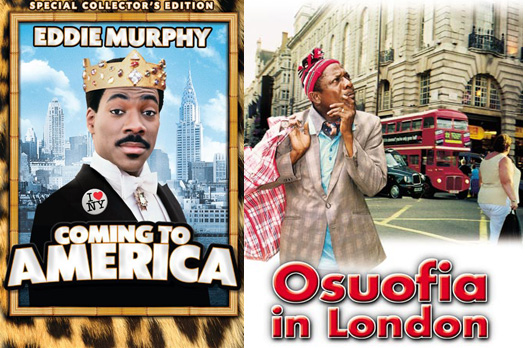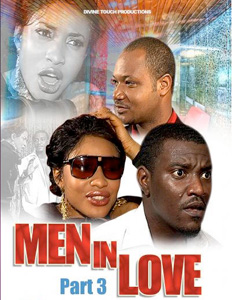Nollywood: An African View of Africa
 By Amarachi Duru
By Amarachi Duru
Bronx Journal Staff Writer
When Africa is portrayed in Western movies, it is usually depicted as an ignorant continent where a large population of its people are starving, dying or waiting to be saved from their demise by more developed countries. Scenes are set in jungles with exotic animals and “Africans” communicating with contrived tribal antics.
Now Africans, specifically Nigerians, are writing and directing movies that show Africa in a more sophisticated and nuanced light. These movies — produced, directed, written and edited by Nigerians — show African men and women who are fully clothed, many times wearing jeans, suits, and tailored blouses. They live in houses, sometimes even in mansions. The mode of transportation is no longer running barefoot, but rather driving cars like Range Rovers, Hummers, and Toyotas.
“These movies give the American public a better view of Africa,” says Uchenna Nwoke a worker at the Kingdom Hall African Market in the Bronx. “It shows them Africa from the African people’s point of view. Finally, we are portrayed as civilized and not like how American media and history books have painted us to be.”
Even though Nigerian movie productions began in the 1960s, the first movie to really give birth to the Nigerian film industry was Living in Bondage. This movie — a tale of ritual sacrifice and cultism — catapulted Nigerian films to the $250 million movie industry now known as Nollywood.
Like many African movies of the past, jungles and wildlife are shown in these contemporary films. However, it is not to illustrate that Africa is underdeveloped, but rather to show the richness and beauty that the continent and the countries within it possess. As a result, many people — and not just Africans — have begun to watch these movies, says Nwoke. “We get a lot of Caribbean customers and I personally think they buy these films because they’re able to relate to them,” he says. “Even though the Caribbean Islands and Africa are in two different part of the world, they still share in the same struggles and the story lines are also familiar to them.”
Customer Fatima Koumba, a 24 year-old native of Burkina Faso, loves watching Nigerian films. “It gives me a sense of pride because, for once in my life, Africa is shown in a different light. Africa is written by the Africans and it is written correctly. When you look at the movies, no one is suffering or has flies all over their face, but rather these people are dressed so nicely and the women’s hair is put together; not shabby and uncombed, ugh!”
It is common sentiment among African natives. Yet, the appeal of these films is much broader — Nollywood is the third largest producer of movies internationally.
Alicia Davis, a 33-year-old native of Jamaica and avid buyer of Nigerian films, explains “I love these films, they are so good. I love them, something about them reminds me of Jamaica.”

these posters feature some of the most popular Nollywood actors and actresses. From the right is Victor Osuagwu, Genevieve Nnaji (center). Chidi Iheme, Rita Dominic,Chenedu Ikedieze(left)
Early Nollywood films include Evil Passions, Forbidden, Nneka The Pretty Serpent, Rattle Snack, and The Evil That Men Do Live After. They had strong narratives that focused on the culture of the Igbo, an ethnic group in southeastern Nigeria. The films delved into marriage, poverty, cultism, love, corruption and jealousy. Living in Bondage is a movie about a married man who is poor, surrounded by wealthier friends who live in luxurious homes. He joins a secret cult, kills his wife in a ritual sacrifice, and becomes wealthy after her murder. Later, he is haunted by his wife’s ghost.
 Today’s Nigerian films still talk about these themes, but they don’t dwell on ritual story lines as much as they did in the past. Rather, they have adopted a western way of writing and western themes such as kidnapping, gun violence, friendships, relationships (break-ups/make-ups), prostitution, and gay love. Previously, Nigerians considered intimate and sexual topics taboo.
Today’s Nigerian films still talk about these themes, but they don’t dwell on ritual story lines as much as they did in the past. Rather, they have adopted a western way of writing and western themes such as kidnapping, gun violence, friendships, relationships (break-ups/make-ups), prostitution, and gay love. Previously, Nigerians considered intimate and sexual topics taboo.
“Nigerian movies from the 90s centered more around Nigerian villages and traditions,” says Nwoke. “Many times Igbo was spoken. But as years went by, the movies became more western. They began to speak English. Maybe that is why a lot of Caribbeans and people from other parts of Africa love the movies. They focus on themes not only familiar to Nigerians, but to people all over the world”
Western with a distinctly Nigerian flair. Take Osufia in London, a comedy about a “bush” village man who travels to England to get his share of an inheritance left to him by a deceased relative. This comic tale follows Osufia’s adventures in England, how he interprets the foreign land and tries to keep his Nigerian village cultural traditions. “Movies like this show the ability of Nigerian directors and producers to relate to a mass number of people, not just Nigerians,” says Onyeka Onuoha, 26-year older Nigerian and lover of Nollywood films.
The rise in popularity of Nollywood films in the Bronx may be because residents can relate to the themes. Once sold primarily in African markets, the films are now sold even in dollar stores — shops with no connection to Africa. “I think people just love these movies, the story lines are captivating that is why they are in such high demand,” says Patrick Osei, owner of the Moonlight African Market in East Gunhill Road.
Even though Nollywood movies are produced on a shoe-string budget and some are filmed in three to five days, people are still addicted to them. Some, like Onyeka Onuoha are saying, “Gimme more, I love them.” Enthusiastic fans like Onyeka are the reason why an average of 2,400 films are being produced each year and Nollywood generates over $250 million a year.
Nollywood is forever evolving, which is one reason why it ranks third behind India’s Bollywood and is one of the most prolific film industries in the world.
Nollywood now faces the challenge of remaining at number three or climbing higher and keeping the Bronx and the world intrigued. As one director suggests in the documentary Welcome to Nollywood, it is a task that comes naturally. “Every Nigerian, every African is a storyteller. Ask any five-year-old girl or boy tell me a story and he will tell you a story and embellish it with such visuals. It is part of the way of life here.” This imagination may be why people keep watching the movies and Nigerian film productions keep pumping them out.
